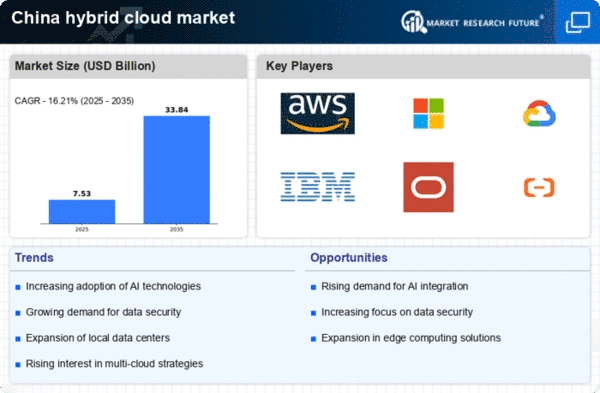Growing Demand for Scalability
The hybrid cloud market in China experiences a notable surge in demand for scalability. As businesses expand, they require flexible IT infrastructures that can adapt to changing workloads. This demand is driven by the need for efficient resource allocation and cost management. According to recent data, approximately 60% of enterprises in China are prioritizing scalable solutions to support their growth strategies. The hybrid cloud model allows organizations to seamlessly integrate on-premises resources with cloud services, enabling them to scale operations without significant capital expenditure. This trend is particularly evident in sectors such as e-commerce and finance, where fluctuating demands necessitate agile IT solutions. Consequently, the hybrid cloud market is poised for substantial growth as companies seek to enhance their operational efficiency and responsiveness to market dynamics.
Innovation in Cloud Technologies
Innovation in cloud technologies serves as a vital driver for the hybrid cloud market in China. The rapid evolution of cloud computing solutions, including advancements in artificial intelligence and machine learning, is reshaping how businesses operate. Companies are increasingly adopting hybrid cloud models to leverage these innovative technologies while maintaining control over their data. Recent reports suggest that investments in cloud innovation are expected to grow by 25% annually in the coming years. This trend indicates a strong commitment from organizations to enhance their technological capabilities and improve service delivery. As a result, the hybrid cloud market is likely to benefit from this wave of innovation, enabling businesses to remain competitive in an ever-changing landscape.
Cost Efficiency and Resource Optimization
Cost efficiency remains a pivotal driver for the hybrid cloud market in China. Organizations are increasingly seeking ways to optimize their IT expenditures while maintaining high performance. The hybrid cloud model offers a compelling solution by allowing businesses to utilize a mix of on-premises and cloud resources, thereby reducing operational costs. Recent studies indicate that companies leveraging hybrid cloud solutions can achieve up to 30% savings on their IT budgets. This financial incentive is particularly attractive to small and medium-sized enterprises (SMEs) that may lack the capital for extensive infrastructure investments. As a result, the hybrid cloud market is witnessing a shift towards more cost-effective IT strategies, enabling organizations to allocate resources more efficiently and invest in innovation.
Regulatory Compliance and Data Sovereignty
In the context of the hybrid cloud market, regulatory compliance and data sovereignty emerge as critical drivers in China. The Chinese government has implemented stringent data protection laws, compelling organizations to ensure that their data management practices align with national regulations. This has led to a growing emphasis on hybrid cloud solutions that facilitate compliance while allowing for data localization. Approximately 70% of Chinese enterprises are now adopting hybrid cloud strategies to navigate these regulatory challenges effectively. By leveraging hybrid cloud architectures, businesses can maintain control over sensitive data while benefiting from the scalability and flexibility of cloud services. This dual approach not only mitigates compliance risks but also enhances the overall security posture of organizations within the hybrid cloud market.
Enhanced Collaboration and Remote Work Capabilities
The hybrid cloud market in China is significantly influenced by the need for enhanced collaboration and remote work capabilities. As organizations increasingly adopt flexible work arrangements, the demand for cloud-based collaboration tools has surged. Hybrid cloud solutions facilitate seamless communication and data sharing among remote teams, thereby improving productivity. Approximately 65% of companies in China report that hybrid cloud technologies have positively impacted their collaboration efforts. This trend is particularly pronounced in industries such as technology and education, where remote work has become a standard practice. By leveraging hybrid cloud infrastructures, organizations can ensure that their employees have access to necessary resources regardless of their location, thus driving the growth of the hybrid cloud market.
















